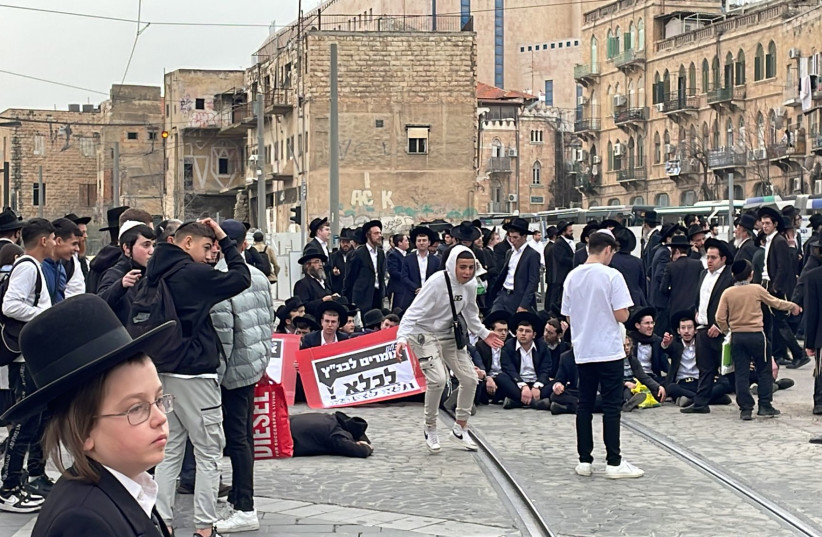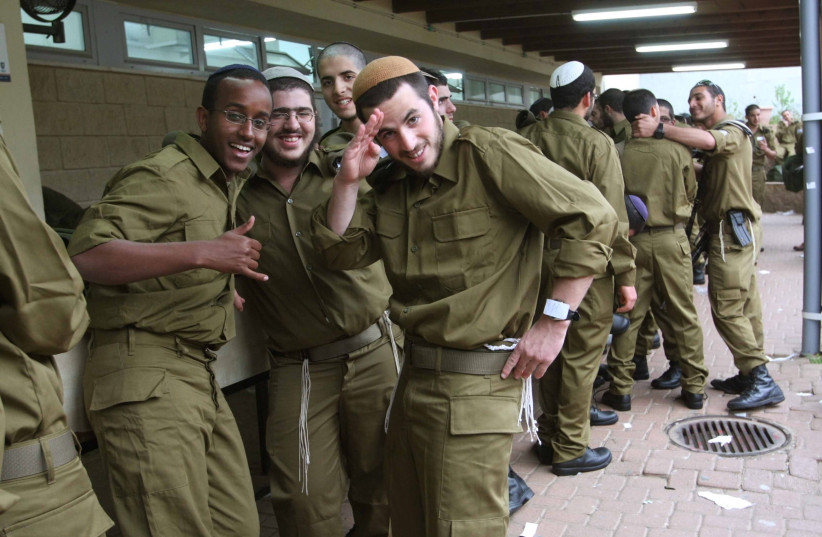Israel’s post-October 7 reality: the urgent need for haredi conscription – analysis
The October 7 earthquake will fundamentally change Israel’s landscape for generations.
It will change the country’s security doctrines, it will change how it views the prospects for peace, and it will change the army.
One of the most glaring lessons from October 7, one the country doesn’t even need to wait for findings of a state commission of inquiry to figure out, is that it needs a bigger army. A much bigger army.
The fantasy that after 75 years and numerous wars Israel’s enemies realize that the Jewish state can’t be defeated, and that Israel has achieved a level of deterrence to keep any actor — even a non-state actor — from doing anything crazy because they know they would get clobbered in return, crashed and burned on October 7.
One of the outgrowths of this fantasy was that though Israel is surrounded by enemies ideologically committed to its destruction, it could suffice with a small, super technologically smart army with state-of-the-art bells and whistles and sensors and super sensitive fences.

But, on October 7, the more than 3,000 bloodthirsty Hamas terrorists who invaded proved all of that to be an illusion. Within minutes, all the high-tech bells and whistles and sensors were neutralized, and there were too few soldiers, too few boots on the ground, to block their murderous advance.
Israel found on October 7 that it needed bodies to fight the enemy and, at that moment, simply did not have enough. So the terrorists sacked kibbutzim and cities and even army bases that did not have enough soldiers to defend them.
To prevent that from ever happening again, the IDF needs soldiers—lots of them.
If, on October 7, there were only four battalions in the Gaza Division protecting that border and two-and-a-half battalions on the northern border facing off against Hezbollah, those numbers need to increase exponentially.
Only if residents of the northern border and Gaza border communities feel the presence of literally thousands of soldiers near their communities — not just a few hundred — will they feel safe to return to their homes even after Hamas is dismantled and Hezbollah is pushed further north of the border.
More soldiers are desperately needed, and they can’t be pulled from the 24 battalions currently in Judea and Samaria because the residents there need security, too.
So where does the army get that additional manpower? Where does it find those feet to fill the boots desperately needed on the ground?
Immigration? Forget about it; it is not a realistic option. Despite the rise in antisemitism, world Jewry won’t be moving here en masse anytime soon to fill in the gaps in the military.
The army, needing a quick-fix solution, put forward its own earlier this month: add to the burden already carried by those in the IDF, both regular soldiers and reservists. Extend the regular tour of duty, add more days of reserved duty each year for the reservists, and make them serve not until they are 42, but rather 45 or even longer.
But that is an unfair solution since it means adding to the load of those already carrying more than their fair share of the country’s security burden.
The other idea is to widen the circle of conscripts. And it is that idea which, yet again, came before the High Court of Justice on Monday when a panel of three judges heard a petition against the government’s decision not to draft yeshiva students.
The question of draft exemptions for yeshiva students is as old as the state itself, and the failure to reach an equitable solution has dogged the country and been a recurring source of friction between the secular and ultra-Orthodox communities for decades.
But this time, it is different. This time, the issue is not a political one; it is not being used merely as a club to bludgeon the haredi population. This time, the issue is taking on existential dimensions.
Despite what many thought, Israel’s security is not guaranteed. October 7 rammed that message home. The country no longer has the luxury of exempting 13% of the Jewish population from carrying the security burden. The counter-argument that the IDF has enough soldiers and doesn’t really need the haredim, but just wants to conscript them to make a point, no longer holds water. The IDF really does need more soldiers.
The haredi community realizes this, which is why some voices have been raised inside Shas saying that those not studying in yeshivot should be serving. This is also why there was a trickle of haredim who, after October 7, volunteered for Shlav Bet service, a truncated army service followed by years of reserve duty.
Something is starting to move, but it is not enough.
According to testimony given by IDF officials last week at the Knesset’s State Control Committee, some 66,000 haredim aged 21-26 were exempted from conscription this year on the grounds of being yeshiva students. Each year, some 12,000 to 13,000 haredim get yeshiva draft exemptions.
According to a 2020 report, some 33% of draft-age Jewish males who should be reporting for army service are not doing so. While the ultra-Orthodox account for 16% of this figure, some 8.3% of army-aged youth are also getting out of service based on mental-health exemptions. The rest either have run into trouble with the law, are exempt because of physical health issues, or are abroad.
Israel no longer has the luxury to afford this, neither haredim who are not serving nor allowing more than 8% of the eligible conscripts out of service based on mental-health exemptions, many of which are believed to be fictitious.

Nor, by the way, does it have the luxury anymore, especially as it extends the length of regular service, to give religious soldiers in the hesder program that combines military service with yeshiva studies as truncated a military service as is currently the case. There is also a need to review the exemptions given to women of draft age on religious grounds.
Israel, overnight, is not going to go from zero to 100 with regard to haredi conscription. Tens of thousands of haredi youth will not abandon the yeshiva study hall en masse and join the army, nor should that be the expectation.
However, not all those 12,000 to 13,000 haredi youth getting deferments each year are studying full time in yeshivot. Not everyone is capable of that, nor wants it. And that segment of the population- those who don’t like to or cannot learn full-time- should be the initial target of conscription efforts.
This will take a shift of mentality amid leading haredi rabbis and political figures. But, according to polls, much of the haredi public is already there.
A survey in December conducted by the Haredi Institute for Public Affairs found that 70% of the haredi community agrees that a haredi individual not studying Torah should contribute to the country through military/national/civil service. Another 51% of haredim polled disagree with haredim receiving a blanket exemption from IDF conscription.
The problem is that, with but a few exceptions, that sentiment has yet to filter up to the community’s rabbis and political leaders. The IDF itself could help grow this sentiment by developing programs for haredim that would enable the haredi conscripts to continue living a haredi lifestyle and even studying while doing army service.
Yediot Ahronot on Monday reported a proposal to create a haredi yeshiva at a border crossing at one of the quieter borders — such as with Jordan — where haredim would be posted permanently in an environment conducive to their lifestyle, meaning — among other elements — that there would be no female soldiers posted there.
A similar type of proposal is being developed in the Air Force. While these ideas may ruffle the feathers of those who want to see the IDF as an altogether gender egalitarian institution, with no gender separation anywhere, if this value clashes with the importance of getting more haredim in the army, the former may need to give way.
Those plans are still very much in the preliminary stages. But that they are even being considered is a good sign, as is the increased readiness of some in the haredi community to serve. If there is will on the one hand and a readiness to create new frameworks inside the army hospitable to haredim on the other, then October 7 may prove to be a catalyst for a very significant societal change.





Comments are closed.